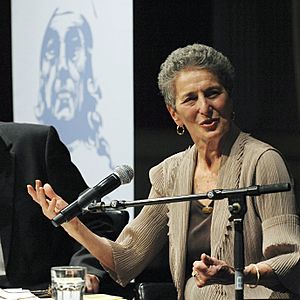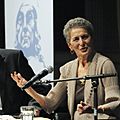Natalie Zemon Davis facts for kids
Quick facts for kids
Natalie Zemon Davis
|
|
|---|---|

Davis in 2010
|
|
| Born | November 8, 1928 Detroit, Michigan, U.S. |
| Died | October 2023 (aged 94) |
| Occupation | Historian, writer |
| Nationality | American, Canadian |
| Alma mater | University of Michigan Cranbrook Kingswood School |
| Spouse | Chandler Davis |
Natalie Zemon Davis (November 8, 1928 – October 22, 2023) was an important historian from both Canada and the United States. She studied the early modern period, which is the time in history from about 1500 to 1800.
She was a professor at the University of Toronto in Canada. Her work first focused on France. Later, she studied other parts of Europe, North America, and the Caribbean. For example, her book Trickster Travels (2006) explored Italy, Spain, Morocco, and parts of Africa. Her books have been translated into many languages. Her book The Return of Martin Guerre was translated 22 times! She was also the second woman to be president of the American Historical Association.
Davis received many awards, including the Holberg International Memorial Prize and the National Humanities Medal. She was also named a Companion of the Order of Canada.
Contents
About Natalie Zemon Davis's Life
Natalie Zemon Davis was born in Detroit, Michigan. She came from a middle-class Jewish family. Her Jewish background helped shape her way of thinking, even though her studies were not mainly about Jewish topics.
She went to Cranbrook Kingswood School and later studied at several universities. These included Smith College, Radcliffe College, Harvard University, and the University of Michigan. She earned her PhD in 1959.
In 1948, she married Chandler Davis. They faced difficulties in the U.S. during a time called the Red Scare. This was when people were very worried about communism. Her husband lost his job as a professor. In the 1960s, they moved to Canada with their three children.
Natalie Zemon Davis taught at several universities. These included Brown University, the University of Toronto, and the University of California at Berkeley. From 1978 until she retired in 1996, she taught at Princeton University. There, she became a special history professor.
She taught courses on early modern France. She also taught about history and anthropology, and the history of women and gender. In 1971, she helped start one of the first courses on women's history in North America at the University of Toronto.
After retiring, she lived in Toronto. She continued to be a professor at the University of Toronto. She passed away in October 2023, when she was 94 years old.
Natalie Zemon Davis's Research and Books
Natalie Davis was very interested in social and cultural history. This means she studied how people lived, thought, and interacted in the past. She especially focused on groups of people that historians had not paid much attention to before.
She used many different kinds of sources for her research. These included court records, plays, tax lists, old books, and even folk tales. She believed in combining history with other subjects like anthropology (the study of human societies and cultures) and literary theory (the study of literature). This is called cross-disciplinary history.
Famous Books by Natalie Zemon Davis
Her most famous book for the public is The Return of Martin Guerre (1983). It tells the true story of a man who pretended to be someone else in a French village in the 1500s. Davis used this story to explore how peasants in that time thought about who they were. This book was also linked to a film called Le retour de Martin Guerre, for which she was a historical advisor.
Davis loved telling stories through history. Her book Fiction in the Archives (1987) looked at old French stories about people asking for forgiveness for crimes.
In Women on the Margins (1995), she explored the lives of three women from the 1600s. They were a Jewish merchant, a Catholic nun who traveled to New France (Canada), and a Protestant artist who studied insects. Davis discussed how religion played a role in their lives.
Her book The Gift in Sixteenth-Century France (2000) explored how gifts and bribes worked in the 1500s. It showed a different way people exchanged things than just buying and selling.
In 2017, she helped with a play called Tous des Oiseaux. This play was about a family in New York and Jerusalem. It included a character studying Leo Africanus, who was the subject of Davis's book Trickster Travels.
Davis also worked on a book called Braided Histories. It is about 18th-century Suriname. She studied how families, both slave and free, communicated and connected on plantations.
Davis sometimes used words like "perhaps" or "she may have thought" in her historical writings. This showed that she was interpreting the past based on clues. Some people thought this was tricky because historians usually stick to facts. But Davis believed that historians must both interpret the past and search for strong evidence. She said this helps people understand that no one has all the "truth" about history.
In her book Slaves on Screen (2000), Davis said that movies can be a good way to tell stories about the past. She called them "thought experiments." But she also said that these movies must be connected to real historical evidence.
Awards and Special Recognition
Natalie Zemon Davis received many important awards for her work.
- In 2000, she won the Aby Warburg Prize. This award is for science in the humanities.
- In 2010, Davis received the Holberg International Memorial Prize. This prize is worth a lot of money (about $700,000 US). She won it for her unique way of telling historical stories. The award said she was "one of the most creative historians writing today." It also said she inspired younger historians and helped connect different subjects.
- In 2011, she became a member of the American Philosophical Society.
- On June 29, 2012, Davis was named a Companion of the Order of Canada. This is the highest honor in Canada. She received her award from the Governor General David Johnston.
- She also received the Canadian version of the Queen Elizabeth II Diamond Jubilee Medal in 2012.
- On July 10, 2013, Davis was given the 2012 National Humanities Medal by President Barack Obama. He honored her for her "insights into the study of history" and for clearly explaining the past.
Honorary Degrees
Natalie Zemon Davis received many special degrees from universities around the world. These are called honorary degrees. They are given to people who have achieved great things.
| Location | Date | School | Degree | Gave commencement address |
|---|---|---|---|---|
| 1977 | Smith College | Doctor of Humane Letters (DHL) | Yes | |
| 1983 | Northwestern University | Doctor of Humane Letters (DHL) | Yes | |
| 1984 | Wesleyan University | Doctor of Letters (D.Litt) | Yes | |
| 1986 | University of Rochester | Doctor of Humane Letters (DHL) | Yes | |
| 1987 | George Washington University | Doctor of Humane Letters (DHL) | Yes | |
| 1987 | Williams College | Doctor of Letters (D.Litt) | Yes | |
| 1987 | Tufts University | Doctor of Letters (D.Litt) | Yes | |
| October 1991 | University of Toronto | Doctor of Letters (D.Litt) | Yes | |
| 1992 | University of Pennsylvania | Doctor of Humane Letters (DHL) | Yes | |
| 1996 | Harvard University | Doctor of Laws (LL.D) | Yes | |
| 1998 | University of Edinburgh | Doctor of Letters (D.Litt) | Yes | |
| 2000 | Hebrew University of Jerusalem | Doctorate | Yes | |
| June 2004 | Concordia University | Doctor of Laws (LL.D) | Yes | |
| Massachusetts | 2005 | Amherst College | Doctor of Humane Letters | |
| Connecticut | May 2013 | Yale University | Doctor of Humanities | |
| September 13, 2013 | University of St Andrews | Doctor of Letters (D.Litt) | Yes | |
| May 14, 2015 | Mount Saint Vincent University | Doctor of Humane Letters (DHL) | Yes | |
| Ontario | October 22, 2021 | Western University | Doctor of Letters (LL.D) |
Natalie Zemon Davis's Published Works
Here are some of the books and essays written by Natalie Zemon Davis:
- "The Rites of Violence: Religious Riot in Sixteenth-Century France", 1973.
- Society and Culture in Early Modern France: Eight Essays, 1975.
- "Women's History" in Transition: the European Case" from Feminist Studies, 1976.
- "Beyond the Market: Books as Gifts in Sixteenth-century France" from Transactions of the Royal Historical Society, 1983.
- The Return of Martin Guerre, 1983.
- Frauen und Gesellschaft am Beginn der Neuzeit, 1986.
- Fiction in the Archives: Pardon Tales and their Tellers in Sixteenth Century France, 1987.
- "Gender in the academy : women and learning from Plato to Princeton", 1990.
- Renaissance and Enlightenment Paradoxes, co-edited with Arlette Farge, 1993.
- Women on the Margins: Three Seventeenth-century Lives, 1995.
- A Life of Learning: Charles Homer Haskins Lecture for 1997, 1997.
- "Religion and Capitalism Once Again? Jewish Merchant Culture in the Seventeenth Century" from Representations, 1997.
- Remaking Impostors: From Martin Guerre to Sommersby, 1997.
- The Gift in Sixteenth-Century France, 2000.
- Slaves on Screen: Film and Historical Vision, 2002.
- Trickster Travels: A Sixteenth-Century Muslim Between Worlds, 2006.
- Listening to the Languages of the People: Lazare Sainéan on Romanian, Yiddish, and French., 2022.
Images for kids
See also
 In Spanish: Natalie Zemon Davis para niños
In Spanish: Natalie Zemon Davis para niños
 | Lonnie Johnson |
 | Granville Woods |
 | Lewis Howard Latimer |
 | James West |


